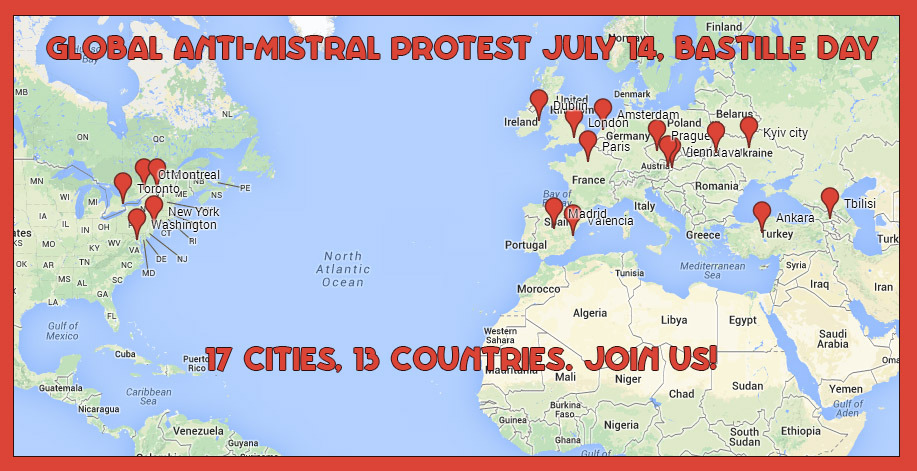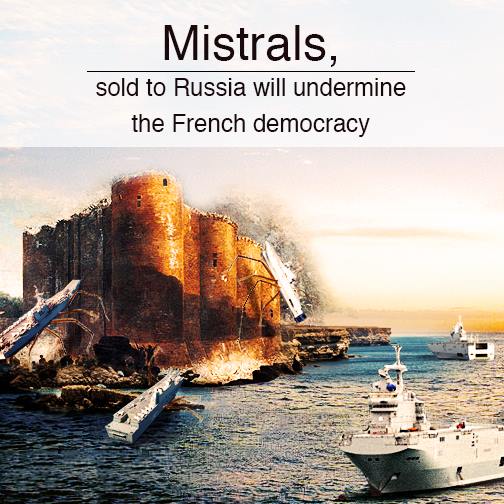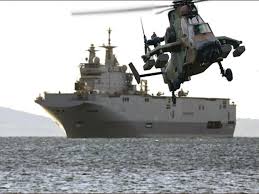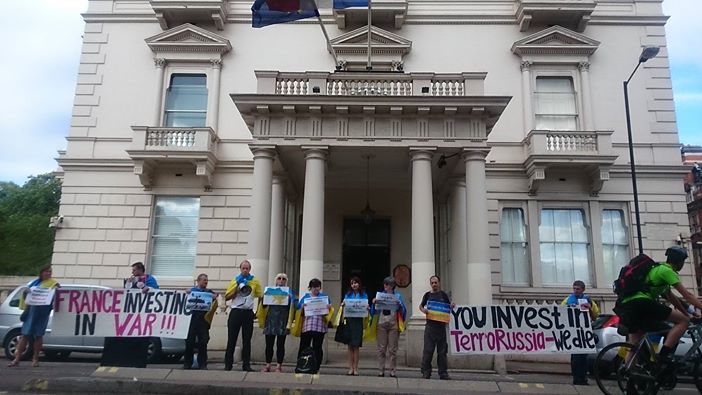By Guil Sho; this article in Ukrainian A series of worldwide protests will mark the French national holiday, Bastille Day, on July 14, 2014. The protest organizers call upon France's President Francois Hollande not to deliver the Mistral invasion vessels to Russia, to look for alternative solutions, and cancel the training of 400 Russian sailors by the French Navy. Read more in The Mistral deal explained, and in Press Release #1 and Press release #2.

Bastille Day
225 years ago, on July 14th 1789, the people of Paris stormed and captured the fortress Bastille. This date marks the beginning of the French revolution, and of French people’s fight for freedom. The Bastille was the symbol of tyranny, as it is where political prisoners were jailed on the basis of arbitrary royal indictments that could not be appealed. This was a key victory, as shortly after the storming of the Bastille, feudalism was abolished (August 4th) and the Declaration of Human Rights was adopted (August 24th
). As a result, for French people, July 14th is the symbol of the victory of democracy and human rights over tyranny. On this important day in French and European history, we ask France not to forget its founding values, and not to become the ally of Russia, one of the last authoritarian regimes in Europe, and a serious threat for peace, democracy and human rights on our continent. France must not collaborate with and arm a regime which imprisons and even kills opponents, just like the tyranny that French people fought against on July 14th, did. French political and business elite do not have the right to betray our memory and to violate our republic’s fundamental principles, by helping Putin, who ignores human rights at home and whose open goal is to redraw European borders by force. France should stop this sale, in order to show to the world and to its citizens that it is still a leading democratic country, for whom human rights, democracy and peace are more important than any other consideration.
La Marseillaise
The French national anthem was written in 1792 by Claude Joseph Rouget de Lisle, during the French revolutionary wars. As the French revolution continued, monarchies in Europe got worried that the revolution will spread to their countries, so they started a war against France. Rouget de Lisle composed this song on the request of the mayor of Strasbourg, who wanted a song "that will rally our soldiers from all over to defend their homeland that is under threat". The song lyrics reflect the invasion of France by foreign armies, namely Prussia and Austria. The original title for the song was “"War Song for the Army of the Rhine". It soon became the rallying song for the French revolution, and was called the Marseillaise after volunteers sang it in Marseille. It was adopted as the national anthem in 1795. A video of Mireille Mathieu singing La Marseillaise (with lyrics) http://www.youtube.com/watch?v=SIxOl1EraXA
| French lyrics | English translation |
| Allons enfants de la Patrie, | Arise, children of the Fatherland, |
| Le jour de gloire est arrivé ! | The day of glory has arrived! |
| Contre nous de la tyrannie, | Against us tyranny |
| L'étendard sanglant est levé, (bis) | Raises its bloody banner (repeat) |
| Entendez-vous dans les campagnes | Do you hear, in the countryside, |
| Mugir ces féroces soldats ? | The roar of those ferocious soldiers? |
| Ils viennent jusque dans vos bras | They're coming right into your arms |
| Égorger vos fils, vos compagnes ! | To cut the throats of your sons and women! |
| Aux armes, citoyens, | To arms, citizens, |
| Formez vos bataillons, | Form your battalions, |
| Marchons, marchons ! | Let's march, let's march! |
| Qu'un sang impur | Let an impure blood |
| Abreuve nos sillons ! | Water our furrows!(repeat) |
| Que veut cette horde d'esclaves, | What does this horde of slaves, |
| De traîtres, de rois conjurés ? | Of traitors and conjured kings want? |
| Pour qui ces ignobles entraves, | For whom are these vile chains, |
| Ces fers dès longtemps préparés ? (bis) | These long-prepared irons? (repeat) |
| Français, pour nous, ah ! quel outrage | Frenchmen, for us, ah! What outrage |
| Quels transports il doit exciter ! | What fury it must arouse! |
| C'est nous qu'on ose méditer | It is us they dare plan |
| De rendre à l'antique esclavage ! | To return to the old slavery! |
| Aux armes, citoyens... | To arms, citizens... |
| Quoi ! des cohortes étrangères | What! Foreign cohorts |
| Feraient la loi dans nos foyers ! | Would make the law in our homes! |
| Quoi ! Ces phalanges mercenaires | What! These mercenary phalanxes |
| Terrasseraient nos fiers guerriers ! (bis) | Would strike down our proud warriors! (repeat) |
| Grand Dieu ! Par des mains enchaînées | Great God ! By chained hands |
| Nos fronts sous le joug se ploieraient | Our brows would yield under the yoke |
| De vils despotes deviendraient | Vile despots would have themselves |
| Les maîtres de nos destinées ! | The masters of our destinies! |
| Aux armes, citoyens... | To arms, citizens... |
| Tremblez, tyrans et vous perfides | Tremble, tyrants and you traitors |
| L'opprobre de tous les partis, | The shame of all parties, |
| Tremblez ! vos projets parricides | Tremble! Your parricidal schemes |
| Vont enfin recevoir leurs prix ! (bis) | Will finally receive their reward! (repeat) |
| Tout est soldat pour vous combattre, | Everyone is a soldier to combat you |
| S'ils tombent, nos jeunes héros, | If they fall, our young heroes, |
| La terre en produit de nouveaux, | The earth will produce new ones, |
| Contre vous tout prêts à se battre ! | Ready to fight against you! |
| Aux armes, citoyens... | To arms, citizens... |
| Français, en guerriers magnanimes, | Frenchmen, as magnanimous warriors, |
| Portez ou retenez vos coups ! | You bear or hold back your blows! |
| Épargnez ces tristes victimes, | You spare those sorry victims, |
| À regret s'armant contre nous. (bis) | Who arm against us with regret. (repeat) |
| Mais ces despotes sanguinaires, | But not these bloodthirsty despots, |
| Mais ces complices de Bouillé, | These accomplices of Bouillé, |
| Tous ces tigres qui, sans pitié, | All these tigers who, mercilessly, |
| Déchirent le sein de leur mère ! | Rip their mother's breast! |
| Aux armes, citoyens... | To arms, citizens... |
| Amour sacré de la Patrie, | Sacred love of the Fatherland, |
| Conduis, soutiens nos bras vengeurs | Lead, support our avenging arms |
| Liberté, Liberté chérie, | Liberty, cherished Liberty, |
| Combats avec tes défenseurs ! (bis) | Fight with thy defenders! (repeat) |
| Sous nos drapeaux que la victoire | Under our flags, shall victory |
| Accoure à tes mâles accents, | Hurry to thy manly accents, |
| Que tes ennemis expirants | That thy expiring enemies, |
| Voient ton triomphe et notre gloire ! | See thy triumph and our glory! |
| Aux armes, citoyens... | To arms, citizens... |
| (Couplet des enfants) | (Children's Verse) |
| Nous entrerons dans la carrière[13] | We shall enter the (military) career |
| Quand nos aînés n'y seront plus, | When our elders are no longer there, |
| Nous y trouverons leur poussière | There we shall find their dust |
| Et la trace de leurs vertus (bis) | And the trace of their virtues (repeat) |
| Bien moins jaloux de leur survivre | Much less keen to survive them |
| Que de partager leur cercueil, | Than to share their coffins, |
| Nous aurons le sublime orgueil | We shall have the sublime pride |
| De les venger ou de les suivre | Of avenging or following them |
| Aux armes, citoyens... | To arms, citizens... |





